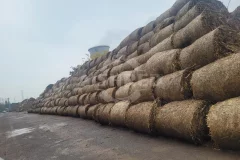
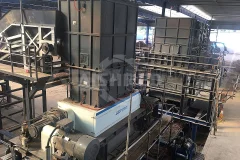
In the global energy landscape, coal remains a dominant player, accounting for a significant portion of electricity generation. Despite its widespread use, coal-fired power plants face mounting criticism for their contribution to greenhouse gas emissions and climate change. As nations strive to meet carbon neutrality goals and adhere to international agreements, the urgency to transition away from traditional coal-fired energy has never been more critical.However, moving entirely away from coal-based power generation presents significant challenges due to its complexity and the time required for complete replacement. As a practical and immediate alternative, cofiring biomass with coal has emerged as an effective transitional solution. By blending biomass—a renewable and carbon-neutral fuel—with coal, power plants can significantly reduce greenhouse gas emissions without requiring extensive modifications to existing infrastructure.Biomass Cofiring MethodsCofiring sustainable biomass with coal can be achieved

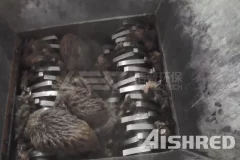
Empty Fruit Bunch Palm Oil Shredder Machine
2023-09-21An empty fruit bunch (EFB) palm oil shredder machine is used to shred and reduce the size of empty fruit bunches, a byproduct of palm oil extraction. These shredder machines are designed to efficiently process and prepare EFBs for various applications, such as biomass fuel production, composting, or mulching. Here are some key points to consider regarding EFB palm oil shredder machines:Working PrincipleEFB shredder machines typically use rotating blades or hammers to shred the tough and fibrous empty fruit bunches into smaller pieces or fibers.The shredding process reduces the volume of EFBs, making them easier to handle and process further. ApplicationsBiomass Fuel Production: Shredded EFBs can be used as a raw material for biomass fuel production, such as EFB pellets or briquettes, which can be burned in biomass power plants.Composting: Shredded EFBs can be added to composting piles to improve the composting process and create nutrient-rich organic fertilizer.Mulching: Shredded EFBs can be used as mulch in
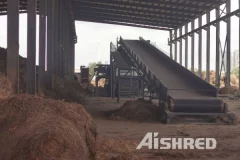
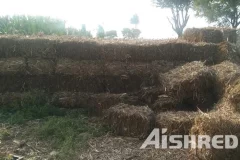
In sugarcane plantations, handling the huge amount of sugarcane leaves that are produced every year is a huge challenge. Fortunately, there are well-established solutions to utilize biomass materials such as sugarcane leaves, which farmers can sell for a certain price. There are many applications of biomass materials such as sugarcane leaves. For example, in the Philippines, Thailand, Brazil, India and other large sugarcane-growing countries, there are many projects using sugarcane leaves as fuel to generate electricity; using these biomass to produce biogas and fuel particles are also one of the most important applications. However, this biomass can only be used if the bundled material is broken up and reduced in size. The AIShred biomass shredder series is specially designed for handling such materials. AIShred Biomass shredder for sugarcane leaves is a kind of industrial shredder called twin-shaft shredder, which has excellentdurability, and the maximum output can reach 60 tons per hour, the average
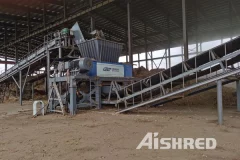
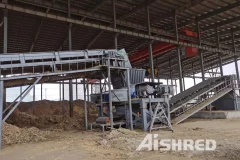
In biomass power plants or thermal plants, which need to consume a large amount of fuel continuously, they buy large amounts of agricultural wastes from farms, such as corn, wheat, rice straw, sugarcane bagasse, palm husks, etc., which are used as fuels that can be burned in boilers. The fuel processing system is the necessary equipment to turn these biomass into qualified fuel, the shredder is the core equipment of the fuel supply system. In the biomass fuel supply system manufactured by AIShred, we recommend the use of a dual-shaft shearing shredder, which can shred the waste to a minimum of 5cm, maximum production capacity upto 60 tons per hour, high water content materials can be handed,which meets the requirements of most biomass power plants. AIShred can help you design a biomass power plant fuel processing system according to your boiler type, site layout and other technical requirements to ensure safe, stable and up-to-standard operation.
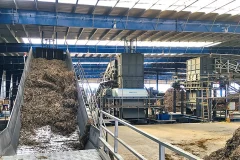
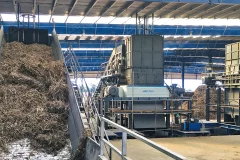
Biomass Waste Processing
2022-03-03Biomass energy, originating from solar energy absorbed by plants through photosynthesis, stands as one of the oldest and most enduring energy sources in human history. The primary modes of human utilization of biomass waste include its conversion into electricity or heat and its use as raw materials for various other products. Currently, nations around the world place significant emphasis on the reutilization of biomass waste. This focus stems from its immense potential to substantially reduce reliance on fossil fuels, decrease carbon emissions, protect the environment, and promote sustainable development.The goal of GEP ECOTECH's biomass recovery solutions is to provide customers with innovative answers that assist them in achieving sustainable energy production and more environmentally friendly resource management. We are dedicated to developing efficient and high-quality technologies to minimize waste and resource inefficiency while also delivering economic benefits. Our vision is to become a leader in



